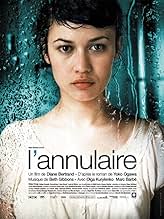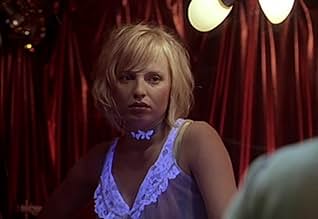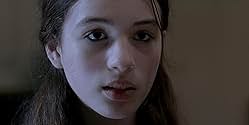AVALIAÇÃO DA IMDb
6,1/10
1,3 mil
SUA AVALIAÇÃO
Adicionar um enredo no seu idiomaIris finds a new job working in a preservation lab where she gradually enters into a troubled relationship with her boss.Iris finds a new job working in a preservation lab where she gradually enters into a troubled relationship with her boss.Iris finds a new job working in a preservation lab where she gradually enters into a troubled relationship with her boss.
- Prêmios
- 1 vitória e 2 indicações no total
Louis Dewynter
- L'enfant
- (as Louis de Winter)
Anja Gräfenstein
- La prostituée
- (as Anja Boche)
- Direção
- Roteiristas
- Elenco e equipe completos
- Produção, bilheteria e muito mais no IMDbPro
Avaliações em destaque
There were a lot of things I enjoyed about this movie. The cover, the synopsis and the concept were really the high points. The lead actress was quite good as well (not bad to look at too). I mean the cinematography was good I guess, but nothing to out the ordinary. I mean you can't rely on gritty filters and a softened colour palate to carry a movie. The concept for this movie really intrigued me and I had begged my friends to rent it a couple times by the cover(instead of "Poisidon" and "When a Stranger Calls"). Just it seemed to me that it was trying too hard to be something and wasn't focusing enough on characters actual motivations and any connection with the real world. "Who is this girl?" is what I'm sure would have been the question if I had convinced anyone I know to watch it with me.
Don't bother. Heard its hard to find so should be a problem for most people.
Don't bother. Heard its hard to find so should be a problem for most people.
This little gem was Olga Kurylenko's (Quantum of Solace, Hit-man, Paris, je t'aime) first film. That is the only thing that attracted me to it. She has a beauty that just draws you in no matter what she stars in.
She has to do a lot of acting in this film, as it is short on dialog. She injures herself in an industrial accident and ends up in a situation with a strange man in a strange job, and sharing a room with a sailor who works nights. The only interaction with the sailor is through what he leaves in the room, but the relationship with her boss takes on an erotic turn.
Despite the absolutely awesome display of femininity by Kurylenko in the musical and visual feast, there just wasn't enough story to carry this all the way.
She has to do a lot of acting in this film, as it is short on dialog. She injures herself in an industrial accident and ends up in a situation with a strange man in a strange job, and sharing a room with a sailor who works nights. The only interaction with the sailor is through what he leaves in the room, but the relationship with her boss takes on an erotic turn.
Despite the absolutely awesome display of femininity by Kurylenko in the musical and visual feast, there just wasn't enough story to carry this all the way.
Saw this at TIFF 2005, my buddy and I went into this movie with no expectations and it ended up being a favorite (top 3 for me) of the film-fest. Unlike most at the fest, the pacing was perfect and each scene was necessary, it's a rare movie today that has such tight editing. The mystery and eros has a slow-burning build....
This was the only film I attended at the fest that left the audience hushed during the credits as well. I wouldn't call it 'eerie', maybe 'otherworldly'? Reminded me a little of polanski's ninth gate somewhat (and that's a good thing), but I doubt that anyone else would make that comparison :) I've been thinking about this movie for five months, figured it would be a shoe-in on the art-house circuit, but haven't heard much yet, this movie deserves to be seen!
This was the only film I attended at the fest that left the audience hushed during the credits as well. I wouldn't call it 'eerie', maybe 'otherworldly'? Reminded me a little of polanski's ninth gate somewhat (and that's a good thing), but I doubt that anyone else would make that comparison :) I've been thinking about this movie for five months, figured it would be a shoe-in on the art-house circuit, but haven't heard much yet, this movie deserves to be seen!
A city with no name, a young woman with no history, a house apart - a strange island in a sea of trees. I like the lack of references to anything external to this system. The world of this movie is airtight. I'm reminded of the famous story retold by W. Somerset Maugham, "Appointment in Samarra", where a man, upon bumping into Death in the streets of Baghdad, flees to Samarra to avoid his wrath, but instead runs into Death who is waiting for him in Samarra, and whose anger at the jostling in Baghdad is revealed to have been mere surprise, as he had been expecting to see the man in Samarra later in the day. The sealed nature of this film demands a focus on inevitability.
A young woman, Iris, wanders alone in the port area of the city, along superannuated towpaths, past the gigantic hulks of international shipping; outside of work the closest she comes to really being with others is staring at prostitutes behind plate glass, or contemplating entering a bar. There's something brutal about the isolation of Iris by the filmmaker. When I reviewed In The City of Sylvia, similarly a beautiful movie with an isolated character, I said that the filmmaker should either have won the Golden Lion at Venice or have been brutally murdered; I've similar feelings here.
Today is Sunday and I've been sat in a deserted office building writing this review, ostensibly here to study for exams, but procrastinating somewhat. The morning streets are almost empty, a white contrail hints at faraway adventures that I'll never be part of, the river is full of empty boats. There is nothing good about being alone; the beauty of it is only a subtle form of cruelty.
The soundtrack of the movie is done by Beth Gibbons of Portishead; its fractured entropised lilt is just right; you only ever catch fragments of lyrics.
Iris gets work as the sole employee in the strange set aside laboratory. The laboratory offers a simple service whereby people may come and, for a fee, have items preserved and stored away. This seems quite a perverse thing to do. Memory, which it seems this film is about, IS perverse. Recently I wrote three poems to a woman I love, who I later learnt has no desire to be with me, I never gave them to her. A colleague tells me I should burn them, and that is perhaps the best thing to do, but perversity wills me to preserve them, to torture myself. Memory becomes viscous ooze in which you are trapped, finally it solidifies and turns into amber. People (mostly children) who can live in the moment, truly do not know how lucky they are.
Some have called the film erotic, however the erotic whilst present, is as intangible as a passing cloud on a sunny day. Marc Barbé's conserver remains inscrutable and devoid of passion during sex scenes. Sex scenes with him are no more or less sensual than seeing a spider cocooning a fly, trapped for inclusion in its larder. One quite disturbing picture from above shows us an image of his head on Iris' body, he is merely consuming her.
Other aspects of the erotic are fetishistic, the focus on the shoes that Iris is made to wear for her work, her clothing, which the sailor who sleeps in her room in the morning feels and smells in her absence. The movie brought to mind for me Magritte's two famous fetishistic paintings, The Red Model, and Philosophy in the Boudoir, both of which show clothing suggesting the female form. (Philosophy in the Boudoir also came to mind during In The City of Sylvia).
Mahjong came into play as it does in all good surreal movies (cross-reference to Robbe-Grillet's The Blue Villa). You could if you want see Iris as a flower tile, and the laboratory door as the white dragon tile (which is a blank tile in Mahjong, or blankness with a rectangular border). These are symbolic, but I don't want to spoil the movie by mentioning how.
Do not watch this movie, arrange to have all copies burnt!
A young woman, Iris, wanders alone in the port area of the city, along superannuated towpaths, past the gigantic hulks of international shipping; outside of work the closest she comes to really being with others is staring at prostitutes behind plate glass, or contemplating entering a bar. There's something brutal about the isolation of Iris by the filmmaker. When I reviewed In The City of Sylvia, similarly a beautiful movie with an isolated character, I said that the filmmaker should either have won the Golden Lion at Venice or have been brutally murdered; I've similar feelings here.
Today is Sunday and I've been sat in a deserted office building writing this review, ostensibly here to study for exams, but procrastinating somewhat. The morning streets are almost empty, a white contrail hints at faraway adventures that I'll never be part of, the river is full of empty boats. There is nothing good about being alone; the beauty of it is only a subtle form of cruelty.
The soundtrack of the movie is done by Beth Gibbons of Portishead; its fractured entropised lilt is just right; you only ever catch fragments of lyrics.
Iris gets work as the sole employee in the strange set aside laboratory. The laboratory offers a simple service whereby people may come and, for a fee, have items preserved and stored away. This seems quite a perverse thing to do. Memory, which it seems this film is about, IS perverse. Recently I wrote three poems to a woman I love, who I later learnt has no desire to be with me, I never gave them to her. A colleague tells me I should burn them, and that is perhaps the best thing to do, but perversity wills me to preserve them, to torture myself. Memory becomes viscous ooze in which you are trapped, finally it solidifies and turns into amber. People (mostly children) who can live in the moment, truly do not know how lucky they are.
Some have called the film erotic, however the erotic whilst present, is as intangible as a passing cloud on a sunny day. Marc Barbé's conserver remains inscrutable and devoid of passion during sex scenes. Sex scenes with him are no more or less sensual than seeing a spider cocooning a fly, trapped for inclusion in its larder. One quite disturbing picture from above shows us an image of his head on Iris' body, he is merely consuming her.
Other aspects of the erotic are fetishistic, the focus on the shoes that Iris is made to wear for her work, her clothing, which the sailor who sleeps in her room in the morning feels and smells in her absence. The movie brought to mind for me Magritte's two famous fetishistic paintings, The Red Model, and Philosophy in the Boudoir, both of which show clothing suggesting the female form. (Philosophy in the Boudoir also came to mind during In The City of Sylvia).
Mahjong came into play as it does in all good surreal movies (cross-reference to Robbe-Grillet's The Blue Villa). You could if you want see Iris as a flower tile, and the laboratory door as the white dragon tile (which is a blank tile in Mahjong, or blankness with a rectangular border). These are symbolic, but I don't want to spoil the movie by mentioning how.
Do not watch this movie, arrange to have all copies burnt!
Very fine film, beautifully photographed and directed with a wonderful central performance from Olga Kurylenko, who of course, has deservedly gone on to find fame and fortune, while this gem languishes, barely seen. I had never heard of it when I picked it up but am certainly glad I did. Based on a book by Japanese author Yoko Ogawa this is a marvellously quirky tale on the nature of obsession and possession. Some have mentioned David Lynch and I would have thought most of his fans would enjoy this. Set mainly in the port of Hamburg, we get a fantastic painterly picture with the increasingly strange happening inside as people visit to have painful memories preserved and thereby contained. Very Japanese in concept and this would have worked more easily in a Japanese setting but this is still a unique experience well worth seeing. Oh, and I almost forgot mesmerising score from Beth Gibbons, which is sadly not available.
Você sabia?
Principais escolhas
Faça login para avaliar e ver a lista de recomendações personalizadas
- How long is The Ring Finger?Fornecido pela Alexa
Detalhes
Bilheteria
- Faturamento bruto mundial
- US$ 17.395
Contribua para esta página
Sugerir uma alteração ou adicionar conteúdo ausente

Principal brecha
By what name was L'annulaire (2005) officially released in Canada in English?
Responda













